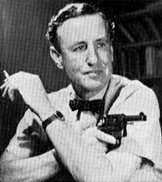
Ian Fleming is best known as the author who created the famous spy protagonist James Bond 007. Born in Oxfordshire, England into a wealthy and prominent family, Fleming grew up with every possible advantage. His father was a Member of Parliament (who died in World War I), and his mother was a socialite who counted Winston Churchill among her closest friends.
Fleming, like his older brother and his father and grandfather before him, attended secondary school at the prestigious Eton College, but left before getting his diploma. He was determined to carve out his own destiny instead of following in the family footsteps on to Oxford. He briefly enrolled in Sandhurst Military Academy but grew bored there and had trouble conforming to strict military rules.
Hoping to shed the burden of his family name and reinvent himself, Fleming moved to Austria and held several different jobs. Eventually, he became a reporter for Reuters and was assigned to cover a spy trial in the Soviet Union, a story that piqued his interest in espionage. In 1933, however, after only a short stint with Reuters, he quit reporting and took a job as a banker in London, hoping to make himself independently wealthy.
During his work for Reuters, Fleming had made extensive contacts in the British intelligence service, which he maintained throughout his years in banking. In 1939, he abruptly dropped out of banking and returned to the Soviet Union to cover a story for the London Times. By all accounts, Fleming had dabbled in low-level espionage for Britain throughout his years as a banker but took his activities up a notch when he returned to the Soviet Union in 1939. The London Times job was likely a front for a secret mission organized by British intelligence.
In May of 1939, Fleming officially joined the British Navy Intelligence Office, acting as an assistant to the director, Admiral John Godfrey, one of Britain's senior intelligence officials. Fleming proved to be well suited to espionage, which allowed him to exercise his vivid imagination in plotting dangerous and elaborate missions, most of which were successful.
Towards the end of World War II, Fleming, now a Commander in the Intelligence Office, took charge of 30 Assault Unit, a group of highly trained commandos sent on specific intelligence missions. Fleming's unit copied and stole valuable Nazi documents and infiltrated German intelligence units. Fleming received high praise for the unit's work, which proved invaluable in the war effort.
After the war, Fleming moved to Jamaica and began his writing career.
His books, he said, were exactly the kind of books he would like to read,
full of detail, action, and espionage. Fleming married and had a child,
but he died young from heart failure on August 12, 1964.